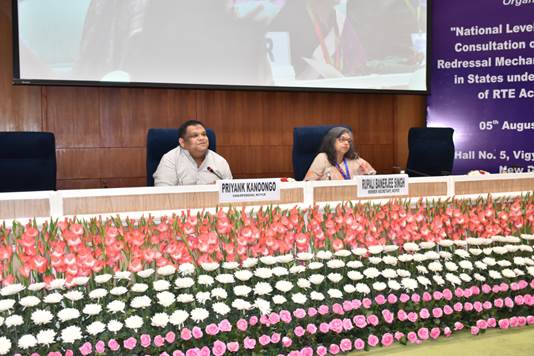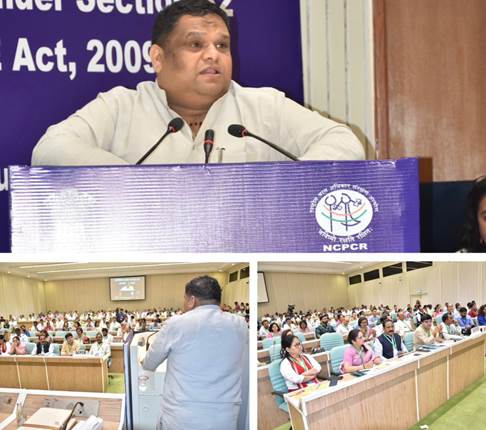
The National Commission for Protection of Child Rights organised a one-day National Level Review-cum-Consultation on Grievance Redressal Mechanisms Developed in States/UTs under Section 32 of RTE Act, 2009 on 5th August, 2024 at Hall No. 5, Vigyan Bhawan, New Delhi.
The main objective of the programme was to review the process of grievance redressal set-up in different States/UTs and deliberate upon the ways in which the mechanism can be made more effective. This is first of its kind Review-cum-Consultation being organized by the Commission at the National Level.
The Commission invited representatives from State Commissions for Protection of Child Rights (SCPCRs), State Education Departments and District Education Officers representing 32 States/UTs.

The Consultation was initiated with an inaugural address by Shri Priyank Kanoongo, Chairperson, National Commission for Protection of Child Rights (NCPCR) highlighting the need to have a robust mechanism in all States for addressing any violation of children’s right to education. He emphasised on the importance of having a ‘Children’s Charter’ in place so that timely redressal of complaints can be done, and children continue to enjoy their rights as laid down by the Law. There should be a stipulated time in which the complaints should be addressed. The time to be taken to resolve a complaint should be interpreted according to the nature of the complaint. The level of authority should also be decided where the complaint should be sent for redressal on the basis of the nature of the complaint. The schools should be made aware of the local authority and appellate authority notified in each State/UT under the provision of the RTE Act, 2009. States/UTs should take help of digital technology to establish the grievance redressal mechanism. He emphasized on the 73rd Amendment Act and 11th and 12th Schedule of the Constitution and Section 6 and 9 of the RTE Act which vests responsibility on the Panchayat and local authority for the education of children. He emphasized that School Development Plan should be made based on the requirement of the children and the nature of the complaints. He further stated that it has been 14 years since the inception of the Right to Education Act, 2009. Addressing complaints and appeals are the first step towards ensuring the rights of the children. He requested the SCPCRs and Education Departments to conduct regular inspections which will also help in highlighting the issues that children face and will increase the grievances. A visit plan should be prepared for periodic inspections. We all should be aware that children don’t have the voice of their own and we can’t expect that they will come to us by themselves. As a potential solution ,benches and grievance redressal camps have been organized by NCPCR at several districts to reach out to more number of children whose rights are violated or are facing any difficulty. It has been observed that most of the times children don’t know that their rights are being violated. District Education Officers often do not know about the practical problems that the children are facing in their day to day activities. There are many minute complaints that are not addressed and require solutions. The experiences that have been gained over the period of time should be utilised to help those who face problems currently.

He further requested all State officials to conduct an audit of the schools on the basis of School Safety Manual developed by NCPCR as a bench mark document before reopening of schools after summer vacation/winter vacation, the report for which should be sent to the SPCPRs. Teachers should be involved in this process to make it more efficient. The United Nations Convention on the Rights of the Child gives children the right to participate which is why children should be consulted at least once a year as to what they want in their schools. To end on a positive note, he highlighted how rare it is to have the chance to make a difference in someone else’s life. Since children can’t do it on their own, we are fortunate to have the ability to step in and create that change.
Thereafter, the State Commission for Protection of Child Rights and State Education Departments presented the mechanism that is being followed in their respective States/UTs as given u/s 32 of the RTE Act, 2009.
The review was followed by an open house discussion, where views and suggestions of all participants including district level education officers were discussed from the respective States/UTs.
At the end of the program, Ms. Rupali Banerjee Singh, Member Secretary, NCPCR thanked all the participants for their active participation and also appealed for their cooperation in future.
****
SS/MS

